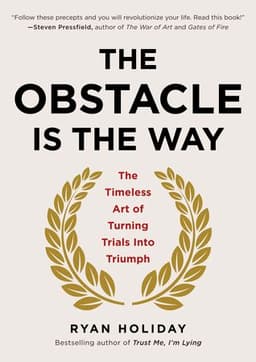
The Obstacle Is the Way Book Summary
The Timeless Art of Turning Trials into Triumph
Book by Ryan Holiday
Summary
The Obstacle Is the Way presents a practical formula for overcoming life's challenges and achieving success by controlling perceptions, taking decisive action, and cultivating an indomitable will.
Sign in to rate
Average Rating: 4.5
1. Perception
The Three Critical Steps to Overcoming Life's Obstacles
Overcoming obstacles is a discipline of three critical steps:
- Perceive things as they are (Perception),
- Take appropriate action (Action),
- Cultivate an indomitable will (Will).
Perception involves controlling emotions and objectivity assessing the situation. Action means breaking down problems and acting appropriately. Will is the inner strength and resilience to handle defeat and difficulty.
Section: 1, Chapter: 1
"There Is No Good or Bad Without Us, There Is Only Perception"
"There is no good or bad without us, there is only perception. There is the event itself and the story we tell ourselves about what it means."
Section: 1, Chapter: 2
iques for Steadying Your Nerves During Challenging Times
When faced with obstacles or stress, you can steady your nerves by:
- Catching your mind when it wanders to negative thoughts or worst-case scenarios
- Focusing on the present moment and task at hand, not getting distracted
- Discarding thoughts that aren't constructive
- Reminding yourself that stress and pressure will pass
- Preparing yourself to calmly face challenges without getting rattled
Section: 1, Chapter: 2
How to Control Your Emotions and Keep an Even Keel
Try this exercise when emotions start to get the best of you:
- Acknowledge the emotion you're feeling
- Ask if it is a helpful or constructive emotion
- If not, focus on the logic of the situation
- Walk through a series of rational questions to reframe your perspective
- Remind yourself that while the emotion is real, you don't have to be consumed by it
- Channel your energy into constructive action instead
Section: 1, Chapter: 3
Practicing Objectivity by Describing Events Without Embellishment
Develop the skill of describing events objectively, without exaggeration or embellishment. Stick to the facts of what happened, without ascribing meaning or making judgements. See things for what they are, not how you wish or fear them to be. By separating perception from reality, you can assess situations more accurately and avoid unproductive emotions.
Section: 1, Chapter: 4
Framing - An Individual's Way of Looking at the World
The discipline of perception relies on two key concepts:
- Context - Understanding the larger picture beyond just what is immediately visible
- Framing - An individual's unique perspective and interpretation
Framing is how we look at the world and ascribe meaning. By intentionally choosing frames that are constructive and motivating, we can alter obstacles into opportunities. Reframing a situation can allow us to maintain objectivity and see things in a way that enables forward progress.
Section: 1, Chapter: 5
Focusing on What You Can Control
Wasting energy and attention on things outside your control is unproductive and disempowering. Instead, focus exclusively on the things within your sphere of influence:
- Your emotions
- Your judgements
- Your creativity
- Your attitude
- Your perspective
- Your desires
- Your decisions
By directing your effort to what you can actually impact, you increase your power and ability to navigate difficulties. Everything else is just a distraction.
Section: 1, Chapter: 6
Steve Jobs and the Power of Framing Obstacles as Opportunities
Steve Jobs was famous for pushing people beyond their perceived limits and turning the impossible into reality. When confronted with obstacles like the lack of a computer mouse, or aggressive timetables, Jobs simply refused to accept them. He would reframe challenges as opportunities, enabling his teams to find creative solutions. His mindset turned obstacles into advantages.
Section: 1, Chapter: 7
Finding the Opportunity Within the Obstacle
In any difficult situation, look for the ways it can actually move you forward. What looks like an impediment at first glance might actually be a catalyst if seen differently. Some examples:
- A bad boss is an opportunity to develop patience and people skills
- An aggressive competitor keeps you alert and pushes you to be better
- Getting fired frees you to find a better job or start a business
- Limited funding forces you to be resourceful and creative
Overcoming obstacles requires finding the hidden paths within them. Treat constraints as benefits that enable you to do things you otherwise wouldn't.
Section: 1, Chapter: 8
Turning Knowledge Into Power Through Action
Perception alone is not enough - it must be coupled with Action to have an impact. While it's critical to see things clearly and find the right perspective, that means nothing if not acted upon. You must prepare yourself to put your perceptions and insights to work through disciplined, persistent effort. Knowledge and vision can only take you so far. Directed action is what turns them into results.
Section: 1, Chapter: 9
2. Action
Action Is What Separates the Successful From the Failures
While perception is crucial, it must be combined with Action to achieve success. Action involves breaking problems down into components that can be solved with energy and creativity. It's not enough to just have vision or knowledge - you must put in the disciplined effort to achieve results. Those who cultivate their skills and then put them to work are the ones who overcome obstacles and accomplish their goals.
Section: 2, Chapter: 10
Grant's Relentless Persistence at the Siege of Vicksburg
During the Civil War, Ulysses S. Grant refused to give up in his attempt to capture the city of Vicksburg. For over a year, he tried various strategies, from direct assaults to building canals, all without success. But he persisted, trying one approach after another, until he finally succeeded. In the process, he learned that persistence itself was a strategic advantage that could wear down opponents.
Section: 2, Chapter: 11
Iterate Your Way to Success Through Trial and Error
Failure is a part of any successful endeavor. The key is to use failure as a way to learn and improve. Rather than being discouraged by setbacks, analyze them objectively to find ways to do better. Treat failure as an opportunity to iterate, abandoning what doesn't work and focusing on what shows promise. View failures as a natural part of the trial and error process that ultimately leads to success.
When taking on an ambitious, complex goal, avoid becoming overwhelmed by keeping your attention on the process. Break the bigger objective down into manageable steps and focus exclusively on executing them in the moment. Don't get distracted by the size of the challenge or the distant prize. Simply concentrate on the task at hand and trust that by following the process, you will reach the destination. Focus on the Process, Not the Prize.
Section: 2, Chapter: 12
"Do Your Job, Do It Right"
"Everything we do matters — whether it's making smoothies while you save up money or studying for the bar — even after you already achieved the success you sought. Everything is a chance to do and be your best. Only self-absorbed assholes think they are too good for whatever their current station requires."
Section: 2, Chapter: 13
How to Craft an Effective Flank Attack to Bypass Obstacles
A "flanking maneuver" is a technique of attacking a problem from an unexpected direction rather than head-on. It requires strategic creativity and a willingness to try unorthodox approaches. To execute a successful flank attack:
- Identify the obstacle's weaknesses and vulnerabilities
- Look for a path of "least resistance" where you can make progress
- Appear to be moving in one direction while advancing in another
- Strike decisively where the obstacle is unprepared
Flanking maneuvers allow you to advance indirectly when direct attacks are ineffective.
Section: 2, Chapter: 14
Channel Your Energy Into Focused Determination
When faced with a frustrating situation outside your control, channel your irritation into motivation. Don't waste energy complaining or wishing things were different. Instead, funnel your emotions into action - let your frustration drive you to find a solution. Stay loose and flexible so you can adapt to changing circumstances. Focus on maintaining forward momentum, even if you have to change course to get there.
Look for opportunities to take proactive steps that put you in control. This could mean:
- Proposing solutions instead of just pointing out problems
- Reframing a weakness as a strength
- Forcing others to respond to you rather than the other way around
- Creating a plan while others are still processing what happened
By seizing the initiative and taking bold action, you can turn an obstacle to your advantage and direct events on your terms. An offensive posture beats a defensive one.
Section: 2, Chapter: 15
Always Be Prepared for Things to Go Wrong
No matter how well you plan and execute, the unexpected will happen. Don't be caught off guard when your initial efforts don't succeed - anticipate setbacks and have contingency plans ready. Always have a bias towards action, trying one thing after another until you find what works. Persistence is more important than perfection. Focus on what you can control and keep moving forward until you find a way.
Section: 2, Chapter: 15
3. Will
Cultivating an Inner Citadel of the Mind
The final discipline required for overcoming obstacles is the Will. If Perception and Action are the disciplines of the mind and body, Will is the discipline of the heart and soul. Will is the mental fortitude to deal with difficult circumstances and maintain our determination in spite of adversity. It's what allows us to bear misfortune without breaking. We cultivate Will by building an "Inner Citadel" - a mental fortress of wisdom and strength that external events cannot breach.
Section: 3, Chapter: 16
Theodore Roosevelt Willed Himself to Greatness
Despite being born sickly and asthmatic, Theodore Roosevelt pushed himself to become strong and resilient through sheer force of will. When his father told him, "You have the mind but you have not the body, and without the help of the body the mind cannot go as far as it should," Roosevelt replied, "I will make my body." He then embarked on a program of physical exercise and exertion to transform himself. This early training in willpower enabled him to endure immense difficulties throughout his life and career.
Section: 3, Chapter: 16
Prepare Yourself for Adversity Before It Arrives
Don't wait until you are in the midst of a crisis to develop the strength and resilience to overcome it. Train yourself in advance for the inevitable challenges life will bring. Build your "Inner Citadel" now through:
- Physical exercise and exertion to develop toughness
- Mental discipline to control your thoughts and emotions
- Studying wisdom to provide perspective and guidance
- Voluntary discomfort to expand your comfort zone
By actively preparing yourself ahead of time, you will be ready when obstacles arise.
Section: 3, Chapter: 17
The Power of Negative Visualization and Anticipation
One way to prepare for adversity is through an exercise the Stoics called "premeditatio malorum" - the premeditation of evils. Take time to vividly imagine worst-case scenarios and how you would respond to them. What would you do if you lost your job? If a loved one died? If a project failed? By anticipating potential obstacles in advance and planning for them, you rob them of their power to shock and dismay you. When the challenge arrives, you'll be ready.
Section: 3, Chapter: 18
Learn to Love Whatever Happens
When difficulties occur, don't just grudgingly accept them - learn to actively embrace them. Have an attitude of "amor fati" - a love of fate. See obstacles as opportunities to grow, learn, and improve. Be grateful for the chance to test yourself and develop your abilities. Maintain a cheerful equanimity in the face of adversity, knowing it's making you stronger. Don't just bear misfortune - thrive because of it.
Section: 3, Chapter: 19
Perseverance Is the Ultimate Skill
"As the Haitian proverb puts it: Behind mountains are more mountains. Elysium is a myth. One does not overcome an obstacle to enter the land of no obstacles. On the contrary, the more you accomplish, the more things will stand in your way. There are always more obstacles, bigger challenges. You're always fighting uphill. Get used to it and train accordingly."
Section: 3, Chapter: 20
Memento Mori - Meditating On Mortality Provides Perspective
One bracing way to cut through trivialities and focus on what matters is to remember you will die. As the Stoics urged, "memento mori" - keep in mind your mortality. When facing an obstacle, ask yourself - if this was my last day, what would I do? How would I face this? Remembering death injects a dose of sobriety and urgency to our actions. It wakes us up and commands us to treat things seriously and make the most of every moment. Let death be a counselor that helps you overcome.
Section: 3, Chapter: 21
Life Is a Continual Process of Overcoming Obstacles
Obstacles are a constant reality of life. As soon as you overcome one challenge, another emerges. Don't expect things to get easier as you become more successful - often the opposite is true. But facing this fact head-on is empowering. Once you accept that obstacles are inevitable, you can focus your energy on being prepared for them. Continually strengthen your Will, sharpen your Perception, and hone your Action. The obstacle is always there - keep yourself ready to meet it.
Section: 3, Chapter: 23
Related Content


Why Buddhism Is True Book Summary
Robert Wright
Robert Wright explores how Buddhist teachings and meditation practices, particularly from the Vipassana tradition, align with findings from modern psychology and evolutionary theory to diagnose the human condition and provide a path to greater clarity, happiness, and moral progress.
Robert Wright explores how Buddhist teachings and meditation practices, particularly from the Vipassana tradition, align with findings from modern psychology and evolutionary theory to diagnose the human condition and provide a path to greater clarity, happiness, and moral progress.
Mindfulness
Religion
Psychology
Science
Philosophy
Happiness

